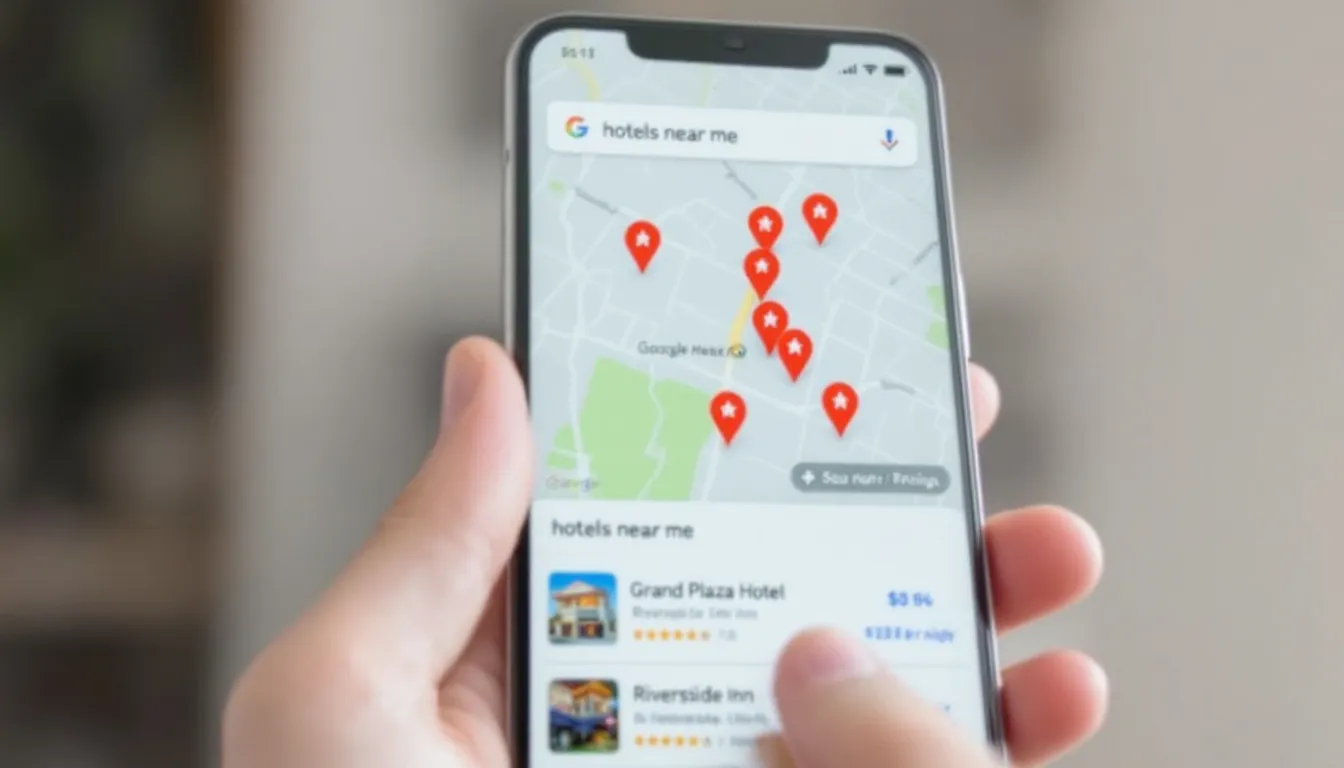Local SEO for Hotels: Best Practices to Boost Bookings and Visibility
 Mika Takahashi
Mika Takahashi Mika Takahashi
Mika TakahashiDid you know that 78% of location-based mobile searches lead to offline purchases within just 24 hours? For hotels, this is a golden opportunity you simply can’t ignore. While online travel agencies (OTAs) have long dominated the booking scene, more and more hotels are waking up to the power of local SEO for hotels. By optimizing your presence for local search, you can capture direct bookings and keep more of your revenue instead of paying hefty commissions.
Local SEO for hotels isn’t just about showing up in search results—it’s about reaching travelers right when they’re ready to book. With 75% of travelers starting their accommodation hunt on Google, appearing for local searches like “boutique hotel near Central Park” or “pet-friendly hotels in Austin” can make a huge difference to your bottom line.
Hotels that invest in a solid local SEO for hotels strategy often see a 25-40% boost in direct bookings compared to those sticking with traditional marketing alone. This guide will walk you through everything you need to know about local SEO for hotels—from mastering your Google Business Profile to advanced tactics that drive real revenue growth.

Local SEO for hotels is all about tailoring your online presence to catch the eye of travelers searching for accommodations in a specific place. Unlike general SEO that targets broad terms, local SEO for hotels zeroes in on location-based queries that show clear booking intent.
When someone searches for “oceanfront resorts Myrtle Beach” or “downtown Chicago hotels with parking,” they aren’t just browsing—they’re ready to book. These local searches are some of the most valuable because they combine geographic intent with commercial purpose.
Consider this: 46% of all Google searches have local intent. For hotels, that means nearly half of your potential online traffic is from travelers actively looking for a place to stay nearby. By optimizing your local SEO for hotels, you position yourself to capture these high-intent visitors before they even think about OTAs.
Local SEO for hotels also helps you reduce your OTA dependency by making sure your property shows up on Google Maps, voice searches, and mobile “near me” queries. When your hotel appears at the top of local search results, complete with attractive photos, positive reviews, and easy direct booking options, you’re paving the way for commission-free reservations.
But the benefits don’t stop there. Strong local SEO for hotels builds brand awareness among travelers, encouraging repeat visits and word-of-mouth referrals. Over time, this organic growth creates a sustainable competitive edge that OTAs just can’t match.
Your Google Business Profile is the cornerstone of any effective local SEO for hotels strategy. This free tool controls how your hotel appears on Google Search and Maps, directly impacting both your visibility and booking rates. Every detail you optimize here makes a difference.
The first step is to claim and verify your hotel’s Google Business Profile. Google’s verification process might take some time, but it’s essential—it proves you own the business and lets you manage your listing fully. Without verification, you can’t optimize or respond to guest reviews.
Once verified, focus on making your profile as complete and accurate as possible. Your NAP (name, address, phone number) must be absolutely consistent across all platforms—any mismatch can confuse search engines and hurt your local SEO for hotels rankings. Make sure your website URL points to a mobile-optimized booking page for the smoothest user experience.
Choosing the right business categories is crucial. Start with “Hotel” as your main category, then add more specific ones like “Boutique Hotel,” “Pet Friendly Hotel,” or “Extended Stay Hotel” to catch niche searches. These categories help Google understand exactly what your property offers.
Don’t overlook Google Posts—they’re a great way to highlight seasonal deals, local events, and your unique amenities. Share posts about your proximity to nearby attractions, special packages for local happenings, or features like free breakfast and complimentary parking. These updates show up right in your Business Profile and can sway booking decisions.

The Q&A section on your profile is often overlooked but can be a goldmine for local SEO for hotels. Use it to answer common guest questions about pet policies, parking, nearby attractions, and amenities like free breakfast or wifi. These answers appear in search results and help influence bookings.
High-quality photos are another must-have. Upload images that showcase your room descriptions, amenities, local sights within walking distance, and seasonal highlights like outdoor pools or holiday decorations. Captions with location-specific keywords can boost your local search relevance.
Enable messaging on your profile to chat directly with potential guests. Many travelers have last-minute questions about your location or services before booking, and quick, helpful responses can turn inquiries into confirmed stays.
Booking buttons and direct reservation links are essential for converting searchers into bookers. Set these up to send visitors straight to your hotel’s website, not third-party platforms. This simple step can significantly increase your direct bookings and reduce OTA commissions.
To nail your local SEO for hotels, you need to understand the full guest journey—from the first idea of a trip to the final booking. Start by researching local keywords that combine your location with hotel-specific terms, like “downtown Chicago hotels with parking” or “family-friendly hotels with pools in Orlando.”
Don’t forget about seasonal and event-based keywords. Think ahead to major local happenings like “hotels near Coachella 2026” or “New Year’s Eve packages Nashville” to capture high-intent traffic when it matters most.
Long-tail keywords with commercial intent are especially valuable. Searches like “pet friendly hotels near downtown with free breakfast” show travelers who know exactly what they want. These keywords might have lower search volume, but they convert at much higher rates than broad terms.
Map out your keywords carefully to avoid internal competition. Assign primary local keywords to your homepage, room descriptions to accommodation pages, and location-specific terms to dedicated landing pages. This strategy ensures each page targets distinct queries while supporting your overall local SEO for hotels efforts.
Voice search is on the rise, so optimize for conversational queries that mimic natural speech. Travelers might ask their devices things like “find me a hotel with a spa near downtown Seattle” or “what’s the best family hotel near the airport?” Your content should answer these questions clearly and naturally.
Build dedicated location pages focused on nearby landmarks, business districts, or popular attractions to capture valuable local search traffic. Optimize for searches like “hotels near convention center” or “accommodation near university campus” to attract guests with specific location needs.
Include practical details to help potential guests decide—distance to major venues, transport options, walking directions to restaurants, and travel times to airports or train stations. This positions your hotel as the most convenient choice for location-conscious travelers.
Add local event calendars and seasonal activity guides to show your hotel’s connection to the community while targeting event-driven searches. This content helps you capture bookings during peak periods and establishes your hotel as a local expert.
Don’t forget to implement local schema markup on these pages. This technical step helps search engines understand your hotel’s relationship to nearby attractions and can improve your visibility with rich snippets.

Local citations are the foundation of trust signals for local SEO for hotels. Search engines use these mentions to verify your hotel’s legitimacy and location. Regularly audit your citations on major directories like TripAdvisor, Yelp, Expedia, Apple Maps, and local tourism boards to spot and fix any inconsistencies.
Ensuring consistent NAP (name, address, phone number) is critical. Even small differences in how your address appears across platforms can confuse search engines and weaken your local SEO for hotels authority. Make sure your hotel name, address format, and phone number are exactly the same everywhere.
Focus on high-authority directories that matter most to search engines. Google, Apple Maps, Bing Places, and Facebook are top priorities, while industry-specific sites like TripAdvisor, Booking.com, and local tourism websites add valuable niche authority.
Don’t forget local Chamber of Commerce directories, tourism bureaus, and hospitality associations. These listings provide strong local search signals and connect you with community networks that can generate referral traffic and local backlinks.
Keep your citations up to date. Phone numbers, contacts, and promotions change, so make citation audits a regular habit to protect your local search rankings and avoid confusing guests.
Online reviews play a double role in local SEO for hotels: they boost search rankings and build trust with potential guests. Develop a system to collect reviews across Google, TripAdvisor, Booking.com, and other platforms your audience uses.
Send post-stay review requests via email 3-7 days after checkout, when the experience is fresh but any issues have been addressed. Include direct links to your Google Business Profile and other review sites to make it easy for guests to leave reviews.
Respond promptly to all reviews—positive and negative. Personalized replies that naturally include local keywords and mention nearby attractions or amenities reinforce your hotel’s local relevance and show you care.
Handle negative reviews with care. Address concerns professionally, offer solutions, and invite offline communication to resolve issues. This approach minimizes SEO damage and builds trust with future guests.
Encourage guests to mention specific local keywords and nearby attractions in their reviews. These details help your local SEO for hotels and provide authentic insights for potential visitors.
Create response templates that weave in location-specific terms while sounding genuine and personal. Mention nearby events, local landmarks, or neighborhood features to boost your hotel’s local relevance and help future guests.
Monitor review sentiment to spot recurring issues and make improvements before they hurt your scores. If multiple guests mention parking challenges or noise, addressing these can raise your ratings and guest satisfaction.
Feature positive review snippets on your website and social channels. These testimonials provide fresh, user-generated content that search engines love and build social proof that influences booking decisions.
Track review volume and average ratings across platforms regularly. Hotels with high ratings and lots of recent reviews tend to rank higher in local search and convert more visitors into guests.

Technical SEO lays the groundwork for all your local SEO for hotels efforts. Implement local business schema markup with hotel-specific details like star rating, price range, amenities, and check-in/check-out policies. This structured data helps search engines understand your offerings and enables rich snippets.
Website speed is crucial for both rankings and conversions, especially on mobile. Aim for load times under 3 seconds by optimizing images, minimizing code, and using content delivery networks that serve content quickly.
Mobile optimization is no longer optional. Most hotel searches start on smartphones, so your website must be responsive and easy to navigate, with simple access to room descriptions, amenities, and direct booking options.
Craft location-specific meta titles and descriptions for every page. Include your city, neighborhood, or nearby landmarks, while writing compelling copy that encourages clicks.
Secure your site with SSL certificates and ensure your booking process is safe. Display security badges prominently to reassure guests about providing payment details directly to your hotel website.
Voice search is growing fast, and queries tend to be longer and more conversational than typed searches. Optimize your content to answer natural questions like “find me a hotel with a spa near downtown Seattle.”
FAQs are perfect for capturing voice search traffic. Address common questions about location, amenities, and policies with clear, concise answers that include local keywords naturally.
“Near me” searches make up a big chunk of voice queries for hotels. Make sure your location pages and schema markup clearly establish your proximity to landmarks, business districts, and attractions to capture these queries.
Write content in a question-and-answer format that mirrors how people speak. Include who, what, where, when, and how questions travelers might ask their voice assistants when looking for accommodations.
Don’t put all your eggs in the Google basket. Apple Maps optimization through Apple Business Connect is essential for reaching iOS users, a large and affluent audience. Claim and optimize your Apple Maps listing with accurate info, quality photos, and detailed amenities.
Bing Places taps into the Microsoft ecosystem, including Windows users and Cortana voice queries. Though smaller than Google, Bing often has less competition, offering a chance for better visibility.
Yelp requires active engagement. Participate in local business discussions, respond quickly to reviews, and keep photos and info current to leverage Yelp’s strong local search presence.
TripAdvisor is both a review site and discovery engine. Keep your ratings high, respond professionally to feedback, and use TripAdvisor’s tools to showcase your hotel’s unique features and location benefits.
Travel platforms like Kayak, Priceline, and local tourism sites rank highly for accommodations. Make sure your hotel is listed with accurate, compelling descriptions that highlight your local advantages.
Apple Maps integrates with Siri voice searches, so focus on conversational keywords and ensure your business info is accurate for iOS users asking Siri for hotel recommendations.
Bing Places offers travel-specific features to highlight amenities, nearby attractions, and seasonal offers that set you apart.
Yelp’s local business community is great for networking and backlinks. Engage with other businesses, attend Yelp events, and keep an active presence to boost visibility.
TripAdvisor’s ranking depends on review quality, responsiveness, and listing completeness. Optimize every field, keep response rates high, and encourage detailed reviews that mention your location perks.

Google Business Profile insights give you vital data on your local search performance. Track profile views, website clicks, phone calls, and direction requests to see how potential guests interact with your listing. These metrics tie directly to booking opportunities and help you prioritize optimizations.
Monitor your local search rankings for target keywords separately from general rankings. Use tools like BrightLocal or Semrush to track your position for location-specific searches and benchmark against competitors.
Set up Google Analytics 4 goals to measure direct bookings from local search traffic. This lets you accurately calculate the ROI of your local SEO for hotels efforts.
Compare the revenue generated from direct bookings tied to local search against your total local SEO investment, including tools, content creation, citation management, and staff time.
Monthly reports should clearly link your local SEO activities to business results. Focus on booking volume, revenue per available room, and average daily rate for guests acquired through local search.
Ranking in the top 3 local search results for target keywords drives most clicks and bookings. Keep a close eye on your rankings and watch for competitor moves that may affect your visibility.
Google Business Profile click-through rates and website visit conversions show how compelling your listing is. Low CTRs might mean you need better photos, descriptions, or review management.
An increase in direct bookings from local search traffic proves your optimization efforts are paying off. Track booking sources over time to see how local SEO reduces reliance on OTAs and their fees.
Review volume and average rating improvements also boost search rankings and conversion rates. Monitor these monthly to spot trends and opportunities for service upgrades.
Accurate local citations and directory presence support your local SEO authority. Regular audits prevent NAP inconsistencies that can confuse search engines and guests.
AI-powered chatbots can handle local search inquiries instantly, providing info about location, amenities, and availability. Implement chatbots that understand local intent and guide potential guests through booking.
Hyper-local content targeting neighborhoods or micro-locations captures travelers with very specific needs. Create content about individual streets, building complexes, or small areas with steady accommodation demand.
Partnering with local businesses opens doors for cross-promotion and valuable local backlinks. Work with nearby restaurants, attractions, and service providers to create mutually beneficial content.
Use predictive analytics to optimize your local SEO strategy around seasonal trends and events. Analyze historical booking patterns and search data to anticipate demand spikes and plan content accordingly.
Emerging tech like augmented reality and visual search will offer new ways to showcase your hotel’s location perks. Stay ahead by maintaining high-quality visuals and exploring early adoption.
The future of local SEO for hotels is about creating digital experiences that match the personal service guests expect. Hotels investing in local SEO today will build lasting advantages that drive more direct bookings and reduce costly OTA commissions.
Local SEO for hotels is one of the most cost-effective marketing tools available. Start by optimizing your Google Business Profile, auditing your citations, and managing reviews systematically. These steps will help you tap into the direct booking opportunities waiting in local search results.